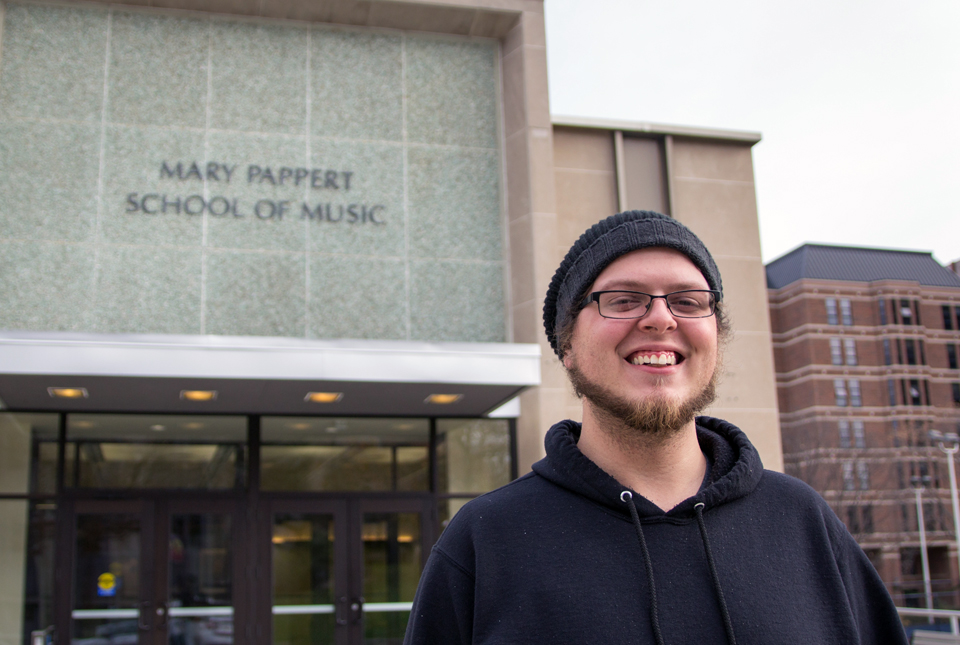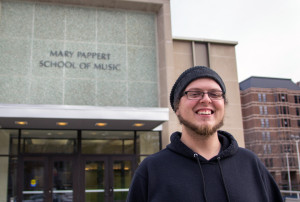
By Sean Ray | a&e editor
The world of professional musicians is a diverse one; they can play different instruments, focus in entirely different genres and perform with fully staffed orchestras or play solo. But there is something appealing about making one’s hobby into a full-on career. The Duke caught up with two of Duquesne’s musicians to get a taste of what life is like in the music world.
Andrew Whitt

Though he started out as a substitute player, Andrew Whitt now plays with the Washington Symphony.
Andrew Whitt is a junior music education major who plays the upright bass. He first began playing music professionally at the end of his freshman year. Now, he plays with the Washington and Westmoreland symphony, earning a pretty payment of $80 to $100 for every rehearsal or show he takes part in.
Whitt got his start playing what he calls “sub gigs” standing in for musicians that were too sick or could not attend certain shows.
Now as a full-time player, Whitt gets the music a bit more ahead of time than just a week, though not by much. At minimum, he receives his sheet music two weeks before the performance, at which point he practices ten days out of those two weeks to prepare.
While symphonies are his favorite kind of gig, Whitt also plays at other venues.
“I do still enjoy playing in bars and such,” Whitt said. “Weddings can be nice, although they are boring sometimes, I’ll admit.”
Moving forward, Whitt wishes to do less sub gigs and more full-time gigs in the future, as well as trying to get into the jazz scene and playing for musical theater. Possibly a good move, as Whitt has had a few interesting moments as a sub player.
“This one time, I was playing with a thrown together community orchestra – was a last minute thing – and a friend of mine was supposed to be doing it and he couldn’t make it,” Whitt said. “I ended up getting there and my stand partner is this older gentleman, and he turns to me after the first song and he just looks at me and he’s like ‘I am so sorry, I don’t know what I’m doing.’”
After college, Whitt plans to become a music teacher while also keeping up his professional music career.
Doryan Ward
Sophomore health management systems major Doryan Ward is a vocalist and bass guitar player with the post-hardcore band S.O.S. He got his start in the music scene during his junior year of high school.
While the rock and roll lifestyle may seem more glamorous than the symphony one, it comes with its own challenges. Ward’s band does not get paid much for a gig; only around $20. Furthermore, a lot of gigs have pay-to-play shows, where bands have to sell a certain amount of tickets before they can make a profit. Ward says this rarely happens.
“We always have problems because a lot of our fans are high school kids who can’t drive and can’t come the whole way to Pittsburgh,” Ward said. “If we have [a gig] that’s close to Duquesne, I’ll get a bunch of people from Duquesne to go, but that’s once in a blue moon.”
Ward believes that pay-to-play shows are ruining local bands that are not able to meet the high expectations most venues expect.
It’s always awful, because it makes you feel like you did something wrong and it makes you not want to play,” Ward said. “It just ruins the night for you, and those gig nights are supped to be an awesome time.”
While S.O.S. usually plays at the Rex Theater in the Southside, Ward’s favorite gigs are actually music festivals rather than smaller scale shows.
“Festivals are pretty much my favorite because they are like regular shows except they’re way bigger and everyone is on equal ground except for the big [bands] that show up every so often,” Ward said.


